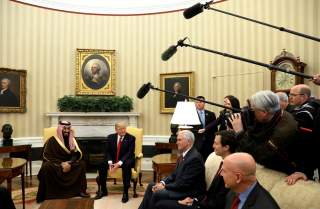Trump's Diplomatic Jujutsu in the Middle East
Escalating tensions between Washington and Tehran could potentially impact Riyadh, whose military is already fighting a costly war against the Houthis.
The U.S.-Saudi bilateral economic agenda is by itself unlikely to help bring desperately needed stability to the broader Middle East.
While it may be tempting for Trump and MbS to tout the strength of the bilateral partnership by focusing on enhanced economic cooperation, it will do little to help resolve the region’s pressing problems.
Instead, instability within the GCC only helps exacerbate the various aforementioned dynamics. It pits Washington against Tehran and Ramallah against Riyadh, which in turn accelerates the proxy war between the Gulf monarchies and the Mullahs of the Islamic Republic.
Despite these risks, the Trump-MbS meeting provides the opportunity to square a few circles. This could happen even though Trump prompted widespread outrage across the Arab world by recognizing Jerusalem as Israel’s capital and despite his decision to put the Islamic Republic on notice by using the JCPOA as leverage—and publicly supporting Iran demonstrators—as part of a strategic effort to force Tehran to modify its regional policies.
By engaging in what appears to be nothing less than diplomatic jujutsu, Trump’s support for Israel and Saudi Arabia could potentially change the region for the better should he be able to provide the Palestinians with a symbolic victory—which could be to recognize East Jerusalem as the capital of Palestine—and use his hardball stance against Tehran to forge a grand bargain with the Islamic Republic that includes regional policies.
Sigurd Neubauer is a Nonresident Fellow at Gulf International Forum. Khalid al-Jaber is the Director of Gulf International Forum.

